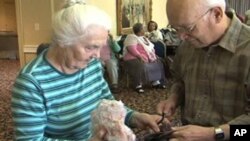Despite a sluggish economy, charitable giving by American people and companies rose more than 6.5 percent last year from 2009.
A study, by the research group Atlas of Giving, suggests the growth in giving was fueled primarily by a robust stock-market performance and greater awareness of people facing tough times because of the economy.
Increased donations
Each week an Arlington, Virginia food bank delivers donated goods to a senior citizens residential building. Without the the items such as canned food, dairy products and frozen meats, many on fixed incomes would be forced to go without or sacrifice other things.
"Well a lot of people have to pay for medicine and different small items, but with this here that helps them be able to keep a little more as far as carrying them through the month," says Mary Lanier, as she fills a bag with donated food.
Without donations from individuals and corporations the Arlington Food Assistance Center would be unable to get food into the hands of about 3,000 people who need it. Despite the economic downturn, donations here grew 26 percent over 2009 and more than a million dollars was raised last year.
"Arlington County residents have traditionally been very generous with AFAC and I think they are coming out of this recession earlier than most, and are willing to give back to their fellow neighbor," says Charles Meng, executive director of the Arlington Food Assistance Center.
Donors like Alois Michalak are among those giving back to their fellow neighbor. "Over the past four years, my wife and I have donated more and more each and every year so I do expect that to continue to happen."
Feeling the pinch
However, some charities in the Washington D.C. area are still feeling the squeeze.
While nationwide donations to the Salvation Army rose two percent to $142 million last year, its largest fundraising drive in the Washington area, the Red Kettle campaign, fell 25 percent below its goal during the Christmas giving season.
"With the amount of people out of work and losing their homes to foreclosures our donors have begun to get hit by that," says Steve Morris, head of The Salvation Army's Washington-area operations. "So we not only saw a decrease in the amount of gifts, but a decrease in the gifts themselves."
During the past several years the organization has also seen a decline in donations from corporations and local businesses. As a result, Morris says The Salvation Army is re-evaluating its resources to avoid possible cuts to programs in Washington and about 3,000 other U.S. communities.
"We are going to have to tighten our belts some in the coming months, frankly," says Morris. "Our commitment is not to diminish services. In fact in this economy we need to be increasing the amount of services we can provide so that is the challenge that we find locally, and I think nationally as well."
Empty shelves
The Salvation Army's thrift store is another place that saw fewer donations last year. The store sells donated items to raise money for charity work, but there are now less items for shoppers.
"The easiest way to tell that our donations are down is by our (sales) floor," says store manager Lonnie Hamilton. "You can look around and see we have a lot of space on the floor."
In the store's warehouse, areas that were once filled with furniture and clothes are now empty. Salvation Army officials say during hard times people tend to hang on to old items longer.
In order for things to improve the store needs more donors like Dawson Williams, who arrives to drop off some items.
"We have a bad recession and there are plenty of people that need items, and we are fortunate that the childrens' clothes we have are lightly used, and hopefully there is another family that has young children that can put them to good use," says Williams.
Some charitable organizations say they are optimistic donations will pick back up this year. Officials say if not they will make do, and maybe scale back programs that help people in need.





